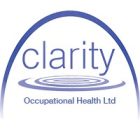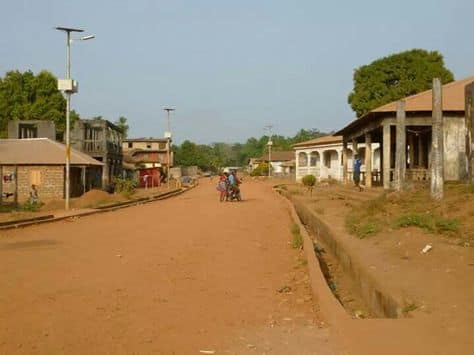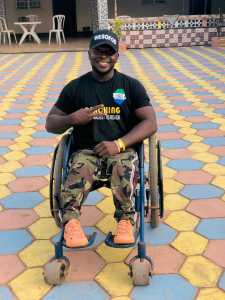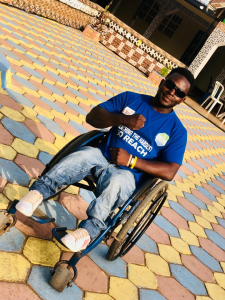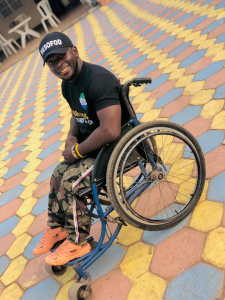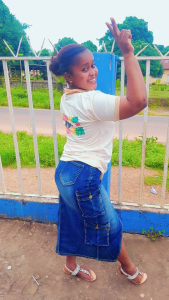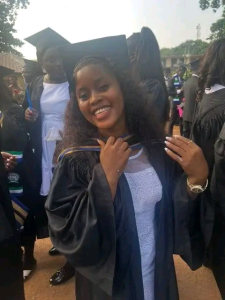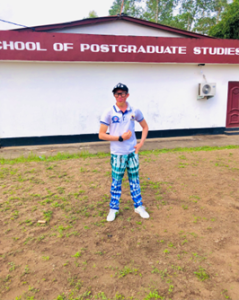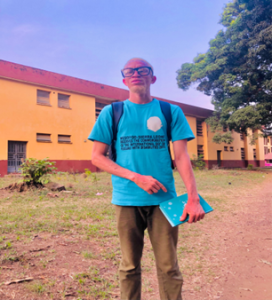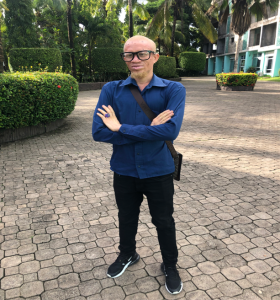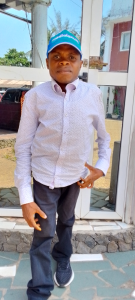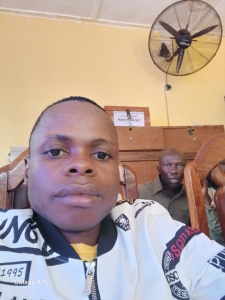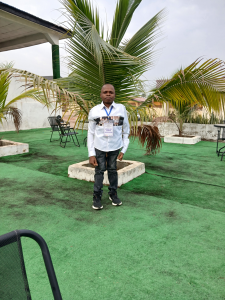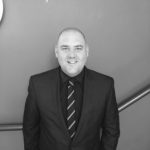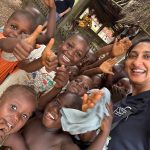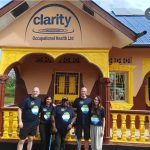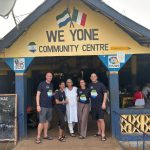This August, we begin something special.
As part of our Clarity: Inclusion in Action campaign, we’re proud to launch the next chapter in our journey: in-person stories from the communities we serve in Kambia, Sierra Leone.
We believe in inclusion that is seen, heard — and felt. That’s why our August series focuses on real voices and individual experiences. Over the coming weeks, we’ll be sharing powerful profiles of the young people, caregivers, and advocates who are shaping this movement from the inside.
Because change doesn’t start with buildings. It starts with people.
Meet the First Voices
Our first in-person stories, gathered in partnership with WESOFOD’s local team, highlight the courage and resilience of disabled children and their families living in some of Kambia’s most underserved villages.
These aren’t charity stories — they’re stories of strength, leadership, and community.
👧 Foday Conteh
Foday Conteh, a university graduate and Project Officer at the Welfare Society for the Disabled in Sierra Leone, has turned a life of hardship into a story of strength. Growing up with a disability in a rural community, Foday faced daily battles with accessibility, discrimination, and poverty — often crawling long distances to attend school while being mocked by others. Despite these challenges, he remained determined to show that “there is ability in disability.” Through perseverance, he earned a university degree and now works to advocate for others like him, helping build a more inclusive future across Sierra Leone.
My name is Foday Conteh. I am a person with disabilities from Sierra Leone West Africa. My journey is one of resilience, determination, and hope. Being a person with a disability in a rural community where I was born, I faced some many challenges in life growing up, and some of the challenges faced are:
Accessibility, it was a daily battle. Schools were far away, and houses were not built for someone like me. So I had to crawl distance just to attend school wherein people stood in their homes watching and laughing at me going. Accessing my home is another battle as there are many steps, the doors are narrow, the toilet facility is poor, etc. Discrimination was another challenge I faced constantly. Many people around me doubted my potential simply because of my disability. They didn’t see me. They only saw what I couldn’t do.
Poverty added to the struggle. Coming from a low income family, there were times when affording basic school supplies was a luxury, and opportunities seemed far out of reach.
But I never gave up because I was determining to prove that there is ability in disability.
Against all odds, I pursue my education with determination and perseverance. Education gave me a voice. It gave me a way out. Today, I am a university graduate with a degree. An achievement that once felt impossible.
I am now working for the Welfare Society for the Disabled-Sierra Leone as a project Officer, an organization of persons with disabilities to help advocate for colleague’s persons with disabilities. I am not just breaking barriers; I am building bridges.
👧 Poreh Marah
Poreh Marah, from Sierra Leone, became disabled at age six due to a medical error. She faced rejection, inaccessibility, and stigma, but remained determined to prove her worth. Despite being abandoned by her father and underestimated by others, she fought for her education, learned hairdressing, and joined advocacy efforts. Today, she is employed, independent, and committed to inspiring others — showing that disability does not define her; strength and resilience do.
My name is Poreh Marah a Sierra Leonean born in Yiffin Town Koinadugu District Nyeni Chiefdom grow up in the capital of Freetown, this is my story-a journey marked by challenges, perseverance, and self-growth. I was never born a disable. I felt ill at age six and my mum took me to a nurse who injected me on my left leg which led to my deformity and life became different for me.
Growing up, I faced countless challenges, both physical, social, emotional barriers. Accessing school was difficult some family members called me bad luck money shouldn’t be wasted on me. Accessing school was difficult my mum was always there for me though she tried hard but resources were limited. She tried her best to cater for my wellbeing. Attending school was a big challenge for me the buildings were not accessible, friends abandon me, teachers didn’t understand my needs. I often felt left out misunderstood and underestimated from both family members and friends. But deep inside of me I knew I had something to offer.
I fought very hard to get an education, even when I walk a long distance to school and rely on some friends for support I pushed myself to learn to grow and to prove that disability does not mean inability. I was molested and thrown away from my father’s house .Along the way I met people who believed in me, I learnt hairdressing skill that I helped support myself I also pushed myself in community and advocacy networks by making use of every chance I had these experience gave me confidence and to speak out .
My life is still not easy but I give thanks and praise to God Almighty that I have a job to take care of myself, I have come a long way my disability is part of me but it does not defines me. What define me are my strength, my resilience, and my determination to create a better future not just for myself but for others like me
I share my story not for pity but for others to inspire, we all have our different battles and challenges and mine has taught me no challenges is too great when you believe in yourself and when others stand by your side because no man is an island and no man stands alone.
👧 Ibrahim Sorie M. A. Kamara
Learners with albinism often face multiple challenges in school environments, particularly related to their vision and skin sensitivity. In addition to these physical barriers, they may also experience discrimination, bullying, and social exclusion from peers, educators, and even members of the wider community.
Meet Ibrahim Sorie M. A., a young man living with albinism in Sierra Leone at a rural African community. My journey through school was marked by numerous challenges, from teasing and isolation by my peers to difficulties with my eyesight and skin sensitivity.
I came from a family of 12 brothers and sisters of which 6 are person with Albinism and the remaining 6 are person without Albinism. My family background is very poor with a true definition of poverty because to have a meal for a day was challenging talk more of three meals a day.
In the community, my parents hardly get a house to live in as a result of we the children that the community did not want to interact with. My parents are treated less in the community they are not included in most of the groups and activities in the community.
In primary school, some of my teachers were frustrating me in school at every given opportunity, some of my classmates would often stare or make fun of my appearance. Despite this, I still excelled in my studies, particularly in mathematics and sports. However, my parents' illiteracy of not having the knowledge on how to take care of us and poverty made it hard for them to afford sunscreen and protective clothing, leaving my skin vulnerable to the harsh sun.
As I progressed to high school, things became even tougher. My parents struggled to pay for my education, and I often had to miss school at times for 3 months due to my parents unable to pay on time. I as well missed classes during hot weather due to my skin condition. Tragically, just as I was about to sit for my West Africa Examination Council (WAEC) exams, I lost both parents. This could have been a devastating blow, but I was determined to succeed.
With the help of the Almighty Allah, I met Mr Joseph Alieu Kamara the Director of WELFARE SOCIETY FOR THE DISABLED-SIERRA LEONE (WESOFOD-SL) and some generous individuals, I was able to continue my education. I worked hard and performed exceptionally well in my WAEC exams, earning me a spot at a prestigious university that is ERNEST BAI KOROMA UNIVERSITY OF SCIENCE AND TECHNOLOGY (EBKUST) MAKENI CAMPUS .
The University life presented its own set of challenges. The intense sunlight during outdoor activities exacerbated my skin condition, and my eyesight struggles made it difficult for me to read from the board in all the lectures until and unless I used phone as an assistive device to aid my sight.
Throughout my university journey, I encountered a lot to a point of even about quitting the course but with some engagement on disability issues added to my perseverance and commitment. My resilience and determination paid off when I graduated with a first-class division, a testament to my hard work and dedication.
My story highlights the importance of support and understanding for individuals with albinism. My experiences underscore the need for:
- Inclusive Education: Schools and universities should strive to provide accommodations and support for students with albinism, ensuring they have equal access to education.
- Community Awareness: Raising awareness about albinism can help dispel myths and misconceptions, promoting a more inclusive and supportive community.
- Access to Essential Resources: Sunscreen, protective clothing, and eye care services are crucial for individuals with albinism. Governments and organizations should work to make these resources more accessible and affordable.
Despite the challenges I faced, my story is a beacon of hope for others living with albinism. My determination and resilience serve as a reminder that with the right support and resources, individuals with albinism can thrive and achieve their goals.
👧 Amara Abu Sumah
Amara Abu Sumah, a young man from Konta Dubala in Sierra Leone, lives with a spinal condition (kyphosis) caused by tuberculosis. As the only child with a disability in his family, he faced stigma, poverty, and was denied early education. At age 15, he enrolled himself in school and later connected with WESOFOD, who supported him with mobility and inclusion. Today, Amara is a university graduate, founder of the Ability Youth Movement (TAYoM), and manager of the Residential Rehabilitation Centre in Kambia — turning hardship into leadership.
My Name is Amara Abu Sumah, am youngster living with disabilities in Sierra leone, grow up in an extended family in kambia District down at konta Dubala.
Am living with disabilities type know as kyphosis due TB which causes the injury of the spine cord, during staying with my family I was not opportunite to access early primary school Education.
There was limited funding my parents to sent me school, among the ten children my parents gave birth am the only child living with disabilities, it was challenged to access early education, health and human rights needs. So due to my Disabilities people in the communities referd me a devil , evil person, at the age of 15 my self enrolled to a community school meet with the headmaster to accept me attend.
Having a square meal a day was challenged , no accessible toilet facilities some time I crowl on the ground to access out door toilet. 2007 come across with WESOFOD it was the first time to access mobility carts to move me around the community and participate
All pain turned to an opportunity
Sometime u have go through some pain before heal your wound
With support from WESOFOD the devil yesterday is the healper in the family
Amra is a graduate from the university and also am heading an organization of persons living with disabilities konw as Ability Youth Movement (TAYoM ) and manager of The Residential Rehabilitation centre RRC kambia District northwest region
I grow up in the Home as beneficiaries for years after university it time to paid back
Why This Matters
Inclusion is not a program. It’s a relationship — and that means listening.
By spotlighting these stories, we hope to shift the narrative around disability and poverty from one of helplessness to one of resilience, partnership, and possibility. These are the leaders, learners, and voices driving Clarity House forward — and it’s their vision we’re here to support.
What’s Next
Over the coming months, we’ll continue collecting and sharing these in-person stories — each one a reflection of what’s possible when communities are given the space and support to lead their own futures.
Our next story set will feature:
- Local WESOFOD team members
- Women’s group leaders
- Health workers visiting Clarity House
We’ll also be preparing for our November visit, where members of our UK-based team will meet these individuals in person and bring their stories back to our wider network.
How You Can Help
🟠 Share these stories
Help us amplify voices that deserve to be heard. Every share brings visibility to communities that have been overlooked for too long.
🟠 Contribute items
We’re still collecting:
Football shirts 🏆 (any team, any size)
Working laptops, tablets & phones 💻 (with chargers)
Email enquiries@clarityocchealth.co.uk to get involved.
This is what inclusion in action really looks like — not just systems and structures, but lives, voices, and futures coming into focus.
Want to learn more about WESOFOD and their mission?
📘Visit: https://www.facebook.com/WESOFOD/
